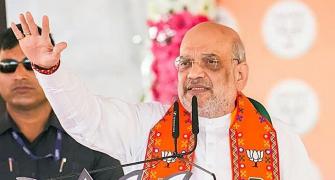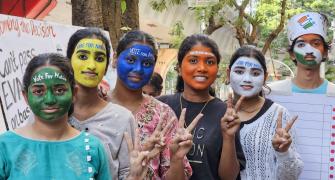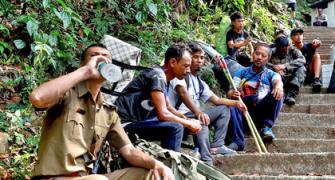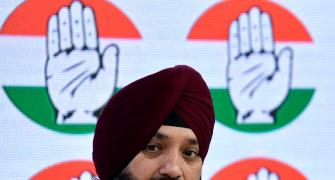After two months of intensive probe into the train blasts in Mumbai, central security agencies and Mumbai police have detained at least six people who were allegedly involved in planning and executing the attacks on July 11.
The detained people are allegedly cadres of Pakistan-based Lashkar-e-Tayiba who are suspected to have executed this plan with help from local cadres of the banned Students Islamic Movement of India, informed sources said.
Leads were picked up by investigators from various states and the hand of the LeT was quite evident, said senior officials attached with the probe.
Nearly 200 people were killed and over 700 injured when bombs went off in commuter trains during the evening peak hour on July 11.
The sources said the blasts were a part of the LeT's policy of spreading terror in the hinterland after the 2002 sectarian violence in Gujarat.
They said the role of top militants Rahil, Fayaz and Zaibuddin Ansari was becoming clearer and they are suspected to be the persons who motivated others to carry out the attacks.
The identity of those detained by Central security agencies and Mumbai police was not being revealed before all checks and verification of their antecedents were completed, the sources said.
Though the hunt was continuing for Fayaz, whose name had also figured in the seizure of arms at Aurangabad and the blast outside Karnavati Express in Gujarat in February that injured 25 people, it is believed that he might have fled the country to Bangaldesh.
Fayaz has been a vital link between the LeT and SIMI, the sources said.
Mohammed Rahil is another person being probed by the intelligence agencies and Mumbai police as his name cropped up during the interrogation of two LeT militants arrested in Delhi in May.
Rahil is believed to have recruited yougsters from Maharashtra and was instrumental in sending some of them to Pakistan via Iran.
Zaibuddin Ansari, whose links with the SIMI have been under the scanner, is believed to be the main person who provided local links for LeT terrorists to execute the train blasts.
He is believed to be currently in Pakistan, the sources said. They said Rahil and Ansari had met the Pakistani terrorist Junaid in Kathmandu. About Junaid, there is no other information available except that he heads the LeT's operations in Nepal.
In Mumbai, police said some "big terrorist group" was behind the July 11 blasts and affirmed their investigations are at a final stage.
"Our investigations have hinted at the role of a big terrorist organisation," a senior official attached to the Anti-Terrorism Squad told PTI.
He, however, denied that Al Qaeda was behind the blasts and rubbished as "baseless" the reports in a section of the media that linked the July 11 blasts with the 9/11 attacks in the US.
For the first time, the ATS revealed the LeT's involvement in the blasts in an application filed in a local court on Monday to seek custody of two suspects, Faisal Shaikh and his brother Muzammil, who were arrested on July 27.
The application said, "The blasts are a part of an international conspiracy involving terrorist outfits across the border. The conspiracy was hatched in Pakistan by Azam Chima, the alleged mastermind behind the blasts."
The ATS said in the application that Faisal had revealed during scientific tests the involvement of international groups.
Muzammil used a mobile phone (number 9869190302) to contact LeT operatives across the border.
Muzammil and Faisal had also undergone training in Pakistan and were in touch with Azam Chima, who is based in Bahwalpur in Pakistan, through one Raheel Atta-ur-Rehman Sheikh who operates from Dubai, the application said.







